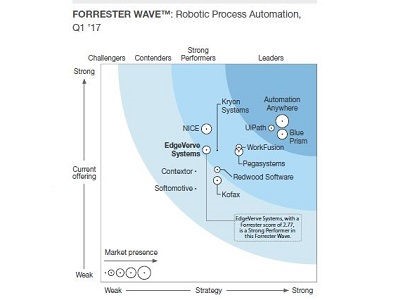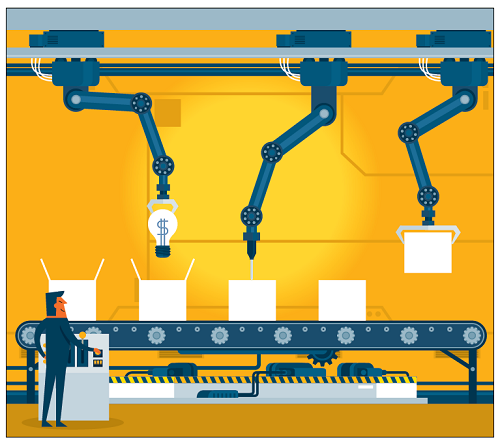There’s a fair amount of excitement around Robotic Process Automation or RPA. Some of it is just hype and some of it has substance. In February of this year, *Forrester forecasted that the size of the RPA market will reach $2.9 billion by 2021 – only to quickly point out that this number pales in comparison to the size of the total Artificial Intelligence (AI) spend estimated at $48.5 billion. Forrester also estimated that there will be over 4 million robots doing office and administrative and sales and related tasks by 2021 and the cost of an RPA robot is currently in the $5,000 to $10,000 range per annum. As a single robot may replace as many as three to five workers – the savings are easy to calculate.** Further, the return on investment (ROI) from RPA has been predicted at a potential of 30–200% —in the first year. ***
While the use of robots is far from new – in the automotive industry the first robot was reported to have been built in 1962 by General Motors – the use of software robots or “bots” to automate high transaction volume, repetitive, and boring work has developed considerably in the past few years. Part of the attraction is that RPA is intended to simply automate work and replicate what humans do. This means that in the majority of cases, negligible process redesign is involved. RPA intends simply to replicate exactly what a human would have done to complete a business operation e.g. if Wealth Management Advisor needs to log into three different systems to onboard a customer then the Robot will do the same thing -except much faster, cheaper and with fewer errors. This is why RPA is sometimes called the “Virtual Workforce”. This also means that RPA has broader applicability to Back Office operations and the cost to automate is typically less as there are few – if any – changes to existing systems.****
Going beyond the hype, there are indeed some substantial practical aspects of RPA that account for the current level of interest.
- Modest project scope: typically aimed at eliminating repetitive rules-based work. A project might begin at the procedure level and move on to progressively more complex automation – or not.
- Minimal systems integration: since RPA typically automates by mimicking human actions at the user interface (UI) level, there is typically minimal intrusion on the underlying systems themselves.
- Small IT department footprint: by avoiding systems integration issues, RPA doesn’t place the resource demands of a large scale implementation project on the IT department.
- Minimal Database Intrusion: by engaging data on the presentation layer RPA automation can often avoid data security issues.*****
Vendors of BPMS software have recognized the potential of RPA. For example, Pegasystems, known for its rules based BPMS, acquired OpenSpan, a RPA vendor with over a decade of experience. On the other hand, Appian – known for its low code, in the cloud based BPMS – entered into a strategic alliance with Blue Prism – one of the leading RPA providers.
Forrester’s evaluation of robotic process automation (RPA) providers, identified the 12 of the most significant ones — Automation Anywhere, Blue Prism, Contextor, EdgeVerve Systems, Kofax, Kryon Systems, NICE, Pegasystems, Redwood Software, Softomotive, UiPath, and WorkFusion — and evaluated them as depicted below.******

There is also significant potential synergy in combining Business Process Management (BPM), Business Process Management Suites (BPMS), and RPA. First of all, employing the BPM method for a disciplined approach to modeling, analysis, design and management of business processes can create the context to get the most out of both RPA and BPMS. A systematic examination of the end to end process will pinpoint the best opportunities to apply RPA for rapid results. Further, the end to end perspective also pinpoints other low hanging fruit related to items such as outdated policies, ineffective metrics, and non-value added handoffs, etc. Next, BPMS software provides important features and capabilities to apply workflow, rules, document management, analytics, and simulation. When BPM and BPMS are combined with RPA organizations can go well beyond simply replicating human activities and begin the fundamental redesign of how work is done.
References:
*Forbes, The RPA Market Will Reach 29 Billion By 2021.
**ibid
***McKinsey Report, The Next Acronym You Need To Know About RPA.
****LinkedIn: How Robotics Process Automation RPA Different.
*****ibid
******The Forrester Wave™: Robotic Process Automation, Q1 2017

















